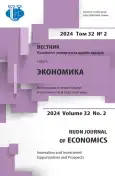Human Capital and Income Decline: Evidence from the Russian Longitudinal Monitoring Survey 2019-2022
- Authors: Balashova S.A.1, Gabrielyan B.V.2,3
-
Affiliations:
- RUDN University
- Yerevan Branch of the Russian Economic University named after G.V. Plekhanov
- Institute of Economics after M. Kotanyan
- Issue: Vol 32, No 2 (2024): INNOVATION AND INVESTMENT: OPPORTUNITIES AND PROSPECTS
- Pages: 205-221
- Section: INTERNATIONAL LABOR MARKET AND INTERNATIONAL MIGRATION
- URL: https://journal-vniispk.ru/2313-2329/article/view/324278
- DOI: https://doi.org/10.22363/2313-2329-2024-32-2-205-221
- EDN: https://elibrary.ru/HVYDHG
- ID: 324278
Cite item
Full Text
Abstract
Human capital is widely regarded as a fundamental driver of economic growth, at least in the innovative and knowledge-based economy. However, the empirical evidence linking human capital with economic outcomes has been problematic both at macroeconomic and microeconomic levels. The estimates obtained in this study, based on RLMS data, show that the conditional probability of a worsening financial situation for people with higher education increased significantly in 2020 and 2022 compared to 2019. Using logit analysis, we calculated the odds ratios for worsening finances for three groups: currently employed versus not employed, reported poor health versus good health, and with tertiary education versus no tertiary education. Individuals with poor health are 20 % more likely to experience a decline in income than those in good health, but worryingly, after 2020 those with tertiary education are also about 1.2 times more likely to experience a decline in income than those with secondary education or less. It does not cast doubt on the positive impact of human capital on the knowledge-based economy. But it raises the question to what extent the characteristics of the knowledge-based economy are maintained during crises. The other question is the extent to which tertiary education today meets the expectations of the labour market and whether the education system has the foresight to ensure a high return on investment in human capital.
Keywords
About the authors
Svetlana A. Balashova
RUDN University
Author for correspondence.
Email: balashova-sa@pfur.ru
ORCID iD: 0000-0003-1797-8825
PhD, Head of Department of Economic and Mathematical Modeling
6 Miklukho-Maklaya St, Moscow, 117198, Russian FederationBella V. Gabrielyan
Yerevan Branch of the Russian Economic University named after G.V. Plekhanov; Institute of Economics after M. Kotanyan
Email: bvgabrielyan@mail.ru
ORCID iD: 0000-0002-7428-7900
PhD, Associate Professor. Head of the Economic Sciences Department, European Economic University named after G.V. Plekhanov, Leading Researcher at the Institute of Economics named after M. Kotanyan NAS RA
5/2 Arzumanyan St, 0015, Republic of Armenia; 15 Grigor Lusavorich St, Yerevan, 0015, Republic of ArmeniaReferences
- Abdullah, A., Doucouliagos, H., & Manning, E. (2015). Does education reduce income inequality? a meta-regression analysis. Journal of Economic Surveys, 29(2), 301-316. https://doi.org/10.1111/joes.12056
- Acemoglu, D., Gallego, F.A., & Robinson, J.A. (2014). Institutions, human capital, and development. Annu. Rev. Econ., 6(1), 875-912.
- Acemoglu, D., Johnson, S., & Robinson, J.A. (2005). Institutions as a fundamental cause of longterm growth. Handbook of Economic Growth, 1, 1138. https://doi.org/10.3386/w10481
- Balashova, S. (2022). Recent Trends in Personal Income and the Impact of Covid-19: Case of Russia. In A.P. Duarte, S. Redzepagic, & F.S. Murta (Eds.), The european integration process crisis and resilience in the aftermath of the covid-19 pandemic (pp. 409-426). Coimbra University Press. https://doi.org/10.14195/978-989-26-2364-1
- Balashova, S., Lazanyuk, I., & Matyushok, V. (2018). Growth Scenarios for the Russian Economy. In B.S. Sergi (Ed.), Exploring the Future of Russia’s Economy and Markets: Towards Sustainable Economic Development (pp. 235-256). London: Emerald Publishing Limited. https://doi.org/10.1108/978-1-78769-397-520181013
- Becker, G. (1993). Human Capital. A Theoretical and Empirical Analysis, with Special Referenceso Education (3d ed.). University of Chicago Press.
- Bulina, A., Mozgovaya, K., & Pakhnin, M. (2020). Human capital in economic growth theory: Classical models and new approaches. St Petersburg University Journal of Economic Studies, 36(2), 163-188. https://doi.org/10.21638/spbu05.2020.201
- Dang, H.A. H., Lokshin, M.M., Abanokova, K., & Bussolo, M. (2020). Welfare Dynamics and Inequality in the Russian Federation During 1994-2015. European Journal of Development Research, 32(4), 812-846. https://doi.org/10.1057/s41287-019-00241-3
- Greene, W.H. (2008). Econometric Analysis (6th ed., Vol. 97.). Pearson Prentice Hall. https://doi.org/10.1198/jasa.2002.s458
- Horowitz, J.L., & Savin, N.E. (2001). Binary response models: Logits, probits and semiparametrics. Journal of Economic Perspectives, 15(4), 43-56. https://doi.org/10.1257/jep.15.4.43
- Khetan, A.K., Yusuf, S., Lopez-Jaramillo, P., Szuba, A., Orlandini, A., Mat-Nasir, N., & Leong, D.P. (2022). Variations in the financial impact of the COVID-19 pandemic across 5 continents: A cross-sectional, individual level analysis. EClinicalMedicine, 44, 1-10. https://doi.org/10.1016/j.eclinm.2022.101284
- Kuzminov, Ya., Sorokin, P., & Froumin, I. (2019). Generic and Specific Skills as Components of Human Capital: New Challenges for Education Theory and Practice. Foresight and STI Governance, 13(2), 19-41.
- Mincer, J. (1958). Investment in Human Capital and Personal Income Distribution. Journal of Political Economy, 66(4), 281-302.
- Nartikoev, A., & Peresetsky, A. (2019). Modeling the dynamics of income distribution in Russia. Applied Econometrics, 54, 105-125. Retrieved from https://econpapers.repec.org/article/risapltrx/0370.htm
- Parry, E., & Urwin, P. (2011). Generational Differences in Work Values: A Review of Theory and Evidence. International Journal of Management Reviews, 13(1), 79-96. https://doi.org/10.1111/j.1468-2370.2010.00285.x
- Romer, P.M. (1989). Human capital and growth: theory and evidence. National Bureau of Economic Research, (3173), 51.
- Rusnak, Z. (2012). Logistic Regression Model. Econometrics, 1(35), 9-23.
- Ryazantsev, S.V., & Rybakovskii, L.L. (2021). Demographic Development of Russia in the 20th-21st Centuries: Historical and Geopolitical Dimensions. Herald of the Russian Academy of Sciences, 91(5), 516-524. https://doi.org/10.1134/S1019331621050075
- Varshavsky, A.E. (2019). Excessive income inequality - problems and threats for Russia. Sotsiologicheskie Issledovaniya, (8), 52-61. https://doi.org/10.31857/S013216250006136-2
- Voskoboynikov, I.B. (2017). Sources of long run economic growth in Russia before and after the global financial crisis. Russian Journal of Economics, 3(4), 348-365. https://doi.org/10.1016/j. ruje.2017.12.003
- Yao, Z., & Liu, Y. (2023). How Covid-19 impacts the financing in SMEs: Evidence from private firms. Economic Analysis and Policy, 79, 1046-1056. https://doi.org/10.1016/j.eap.2023.06.036
Supplementary files









